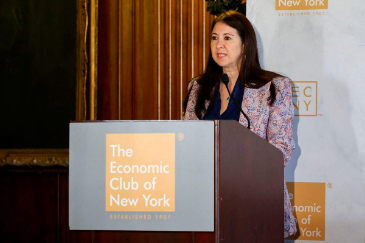Federal Reserve Governor Adriana Kugler will resign effective August 8, 2025, creating a vacancy on the Fed’s Board—and Federal Open Market Committee. President Trump now has the opportunity to nominate a replacement aligned with his preference for aggressive interest rate cuts.
Resignation Details and Timing
Federal Reserve Governor
Adriana Kugler, a labor economist appointed by President Biden in September 2023, confirmed she will step down from the Fed’s Board of Governors effective
August 8, 2025, several months before her term was set to expire in
January 2026 The Times of India+15Reuters+15The Epoch Times+15WSLS+4Newsmax+4Barron's+4. In her resignation letter, she described her service on the Board as an “honor of a lifetime” and said she plans to return to teaching at Georgetown University in the fall
Barron's+7Business Standard+7CNBC+7.
Implications for Fed Appointments
Kugler’s departure creates a vacancy on the Fed’s
seven-member Board of Governors, which also serves on the
Federal Open Market Committee (FOMC), the body that sets U.S. interest rates
Barron's. The timing is significant: it gives President
Donald Trump a rare opportunity to nominate a new member with influence ahead of the Fed’s
late‑September meeting and in advance of
Chair Jerome Powell’s term ending in May 2026 Omni Ekonomi+15Barron's+15Reuters+15.
Political & Policy Dynamics
Trump has been a vocal critic of Powell and the Fed, accusing Powell of delaying rate cuts and recently calling him a “stubborn MORON,” urging the Board to “assume control” if rate cuts are not delivered
washingtonexaminer.com+5The Washington Post+5New York Post+5. Two Trump-appointed governors,
Christopher Waller and
Michelle Bowman, dissented at the most recent FOMC meeting, favoring immediate rate reductions— voices that could now be reinforced by a new appointee
Business Insider+3CNBC+3New York Post+3.
Potential Shift in Monetary Policy
Observers see Kugler’s exit as a potential inflection point. Her tenure was marked by caution, supporting the Fed’s decision to hold rates steady in light of inflation concerns and uncertainty around Trump-era tariffs. Her departure removes a voice that supported a more data-driven and labor-market–focused approach to policymaking
Newsmax+1Barron's+1. A new appointee aligned with Trump could tilt the Board toward earlier and sharper cuts, potentially influencing not only the remainder of the current chair’s term, but also the selection of Powell’s successor after May 2026
Business InsiderThe Economic Times.
Succession and Confirmation Outlook
With Senate Republicans regained thin majorities—and Trump’s allies previously approved appointees like Bowman and Waller—confirmation of a nominee sympathetic to rate cuts may proceed more smoothly
Business Insider. Names being floated include
Kevin Hassett,
Kevin Warsh, and
Scott Bessent, all seen as potentially dovish on monetary policy and possible future Chair candidates .
Broader Concerns and Market Reactions
Financial markets and Fed watchers are increasingly wary of rising political influence over central bank decisions. Analysts warn that favoring politically aligned nominees could undermine the Fed’s credibility and independence, raising the risk of higher inflation expectations among investors .














